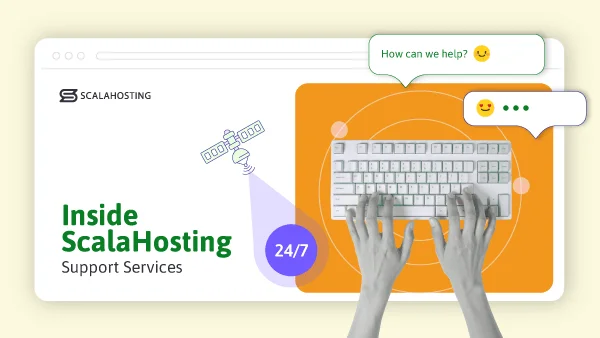Inside ScalaHosting: Performance Optimizations
In web hosting, every provider promises lightning-fast load times, iron-clad uptime, and “unlimited” resources. Yet too often, users run into the same frustrations—slow sites during traffic spikes, hidden CPU restrictions, and infrastructure that buckles under pressure. These performance bottlenecks not only drain resources but also hurt SEO, conversions, and user trust.
ScalaHosting takes a different approach.
ScalaHosting takes a different approach: we engineer for burst speed and stability with high-frequency CPUs, NVMe throughout, and transparent resource policies—no artificial throttling, no surprise slowdowns.
Here’s how we engineer for the fastest cloud hosting the ScalaHosting way—what matters, where others cut corners, and how we avoid the usual bottlenecks.
What Performance Really Means in Web Hosting
When businesses choose a hosting provider, performance is often the number one priority. That should come as no surprise. Fast load times, minimal downtime, and the ability to handle traffic spikes can make or break your online presence, user trust, and search engine optimization efforts.
Ensuring optimal loading speeds seems like a no-brainer, but the hosting industry has a history of big claims that don’t always match reality.
At its core, website performance comes down to three critical areas:
- Speed – How fast do websites and apps load? Every extra second of delay leads to higher bounce rates and lower conversions. In an era where most pages load within a second or two, you cannot afford your site to lag.
- Stability – Is uptime close to 100%? Are there sudden crashes during peak traffic hours? Any second of unexpected downtime leads to a quick loss of user trust and can easily prevent repeat visits or sales.
- Scalability – Can the hosting environment adapt to growth or sudden spikes in demand without compromising performance? You always have to think one step ahead and “predict” the future to avoid bumping into unexpected obstacles.
These are the promises most hosting companies market aggressively. The reality, however, often tells a different story.
Where Many Hosting Providers Fail to Deliver

If you’ve ever dabbled in website building, you already know that hosts like to promise you the sun and the stars, boasting limitless resources and impenetrable security. But while some genuinely make an effort to keep their promises, most are well aware they just want to create a marketing buzz. And the results are quick to strike you…
- Overcrowded Shared Servers
Entry-level shared tiers are frequently oversold—hundreds of sites share the same CPU, RAM, and I/O. One noisy neighbor spikes and everyone’s TTFB and error rates climb. - Low-Cost Infrastructure
Many providers use cheaper, lower-frequency CPUs and slower storage because they can pack more customers per server. This maximizes their margins, but performance for end users suffers. - Overselling Resources
Hosts often sell more server resources than their physical machines allow, assuming that most clients never exhaust their allowed CPU and RAM. This way, when the usage peaks, everyone suffers. - Hidden Throttling
“Unlimited” plans often come with resource throttling once you pass invisible thresholds. That means sites randomly slow down, especially during traffic spikes. Another frequent issue is hosts quickly suspending accounts without giving users enough time and information to try to fix the underlying issue. - Support Bottlenecks
When performance issues arise, customers usually hit automated systems, long queues, or undertrained first-level agents who can’t actually resolve deep technical issues. This leads to increased time with below-par services and growing frustration.
The thing is, many of these issues can easily be avoided. Better hardware is available on the market, resources can be added in practice, and limitations can be increased. But all this takes a toll on the end profits, and many hosts won’t have any of that.
The Vicious Cycle for Customers
Caught between the cogs of corporate ambition, the typical customer journey in web hosting often looks like this:
- A business signs up for “fast, unlimited” hosting at a bargain price, often just a couple of bucks per month.
- The site works fine at first, but load times worsen as traffic grows. We are not even talking about hundreds of people, sometimes even 30-50 unique visitors can prove a burden.
- Support suggests “optimizing the site” or upgrading to a higher plan. While the former advice is sometimes justified, the latter is just an easy push for more host profits without treating the exact issue at hand.
- The business pays more, but performance still lags because the infrastructure itself is the bottleneck.
- Rinse and repeat Steps 2-4.
Sub-par performance is one of the top 3 reasons why clients decide to switch their hosting provider. But if price remains your key selling point as a customer, chances are you will fall into this vicious cycle again.
There’s got to be another way, right?
Well, there sure is!
The ScalaHosting Way: How We Handle Performance Optimizations

At ScalaHosting, performance isn’t a marketing checkbox—it’s the foundation of our infrastructure. Our team spends sleepless nights thinking about how we can shave off even a millisecond so our clients can have a great head start in the website world.
We could squeeze more tenants per server and label the result “good enough.” Instead, we invest in sustained speed because any compromise on our side shows up as lost conversions on yours.
ScalaHosting is in it for the long run. Here is how we believe performance should be approached:
Enterprise-Grade Infrastructure & Hardware
- High-Frequency CPUs
Our servers run on cutting-edge AMD EPYC CPUs bursting over 4GHz. For context, most competitors run at ~2.5GHz. That difference alone can make your website load up to 50% faster.
- Ultra-Fast Storage
We use enterprise-grade NVMe drives delivering 2,500MB/s read speeds and 162,000 read IOPS, paired with a 25Gbps storage network for ultra-low latency read/write operations.
- No Arbitrary CPU Restrictions
You get dedicated CPU power. With KVM we map your vCPUs 1:1 to the physical processor—if you choose 2 vCPUs, you get two real CPU cores’ worth of capacity that’s always yours. There’s no overcommit or hidden throttling, so you’re not competing with neighbors (effectively ~0% CPU steal time), and traffic spikes run on actual compute.
Software Optimized for Speed
- LiteSpeed & OpenLiteSpeed
Choose LiteSpeed Enterprise or OpenLiteSpeed; we pre-tune HTTP/3/QUIC, Brotli, and server-level caching for fast dynamic content.
- Redis Object Caching
In-memory object caching with Redis eliminates repeated disk-bound queries, delivering 10×–100× faster responses on cache hits for database-heavy apps.
- Optimized Web, Database & PHP Services
We right-size PHP workers, OPcache, and MariaDB/InnoDB, and align OS/network settings (TLS, keep-alive, reuse) to reduce TTFB and p95/p99 latency.
Top-Rated Support
- Quick Contact with Trained Experts
Support operators can help you optimize your site performance just as well as your developer. You can easily find assistance through live chat, ticketing, and email, and have a trained professional look at your site.
- No Templates and Runarounds
At ScalaHosting, we believe most issues can be resolved in real-time and for more complex queries – our operator will be glad to submit and escalate a ticket to Level 2 and 3 professionals. Zero time wasted.
Performance Comparison: ScalaHosting vs. Typical Competitor
| Feature | ScalaHosting | Typical Competitor | Impact on Performance |
|---|---|---|---|
| CPU Frequency | AMD EPYC CPUs @ 4GHz+ | Lower-frequency CPUs (~2.2–2.5GHz) | Up to 50% faster TTFB and page load times |
| Storage Type | Enterprise NVMe (2,500MB/s, 162,000 IOPS) | SATA / basic SSD | Faster reads/writes, lower latency |
| Storage Network | 25Gbps ultra-low latency | 10Gbps or less | Faster response under heavy load |
| CPU Usage Policy | 100% of allocated cores available | Throttling or shared limits | Consistent performance under spikes |
| Web Server Technology | LiteSpeed Enterprise / OpenLiteSpeed | Apache or NGINX (often unoptimized) | Faster dynamic content delivery |
| Caching Support | Redis object cache supported | Often not included or requires add-ons | 10x-100x faster page speed on cache hits |
| Infrastructure Philosophy | Performance-first, lower profit margins accepted | Density-first, more sites per server | Customer speed sacrificed for profit |
Final Takes
Most hosting providers talk about performance, but their infrastructure choices—lower-frequency CPUs, oversold servers, hidden throttling—undermine the very speed and stability they promise. Customers are left frustrated and paying more for diminishing returns.
ScalaHosting takes the opposite approach: investing in high-frequency CPUs, NVMe storage, and performance-optimized software, while giving customers full access to the resources they pay for.
The result?
Websites that run faster, scale more smoothly, and deliver a better experience to users around the world. At the end of the day, performance isn’t just a feature—it’s the foundation of your online success.


